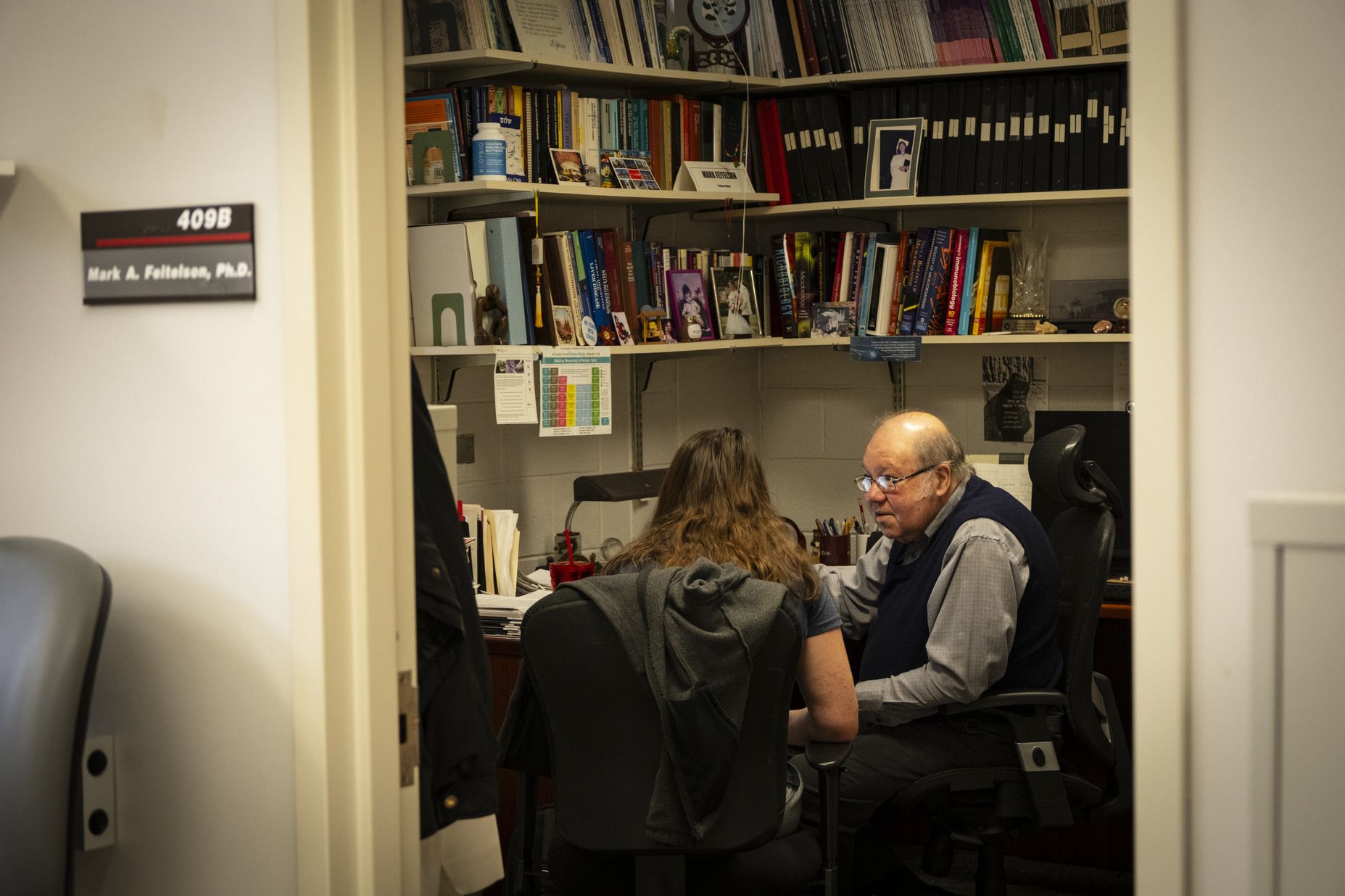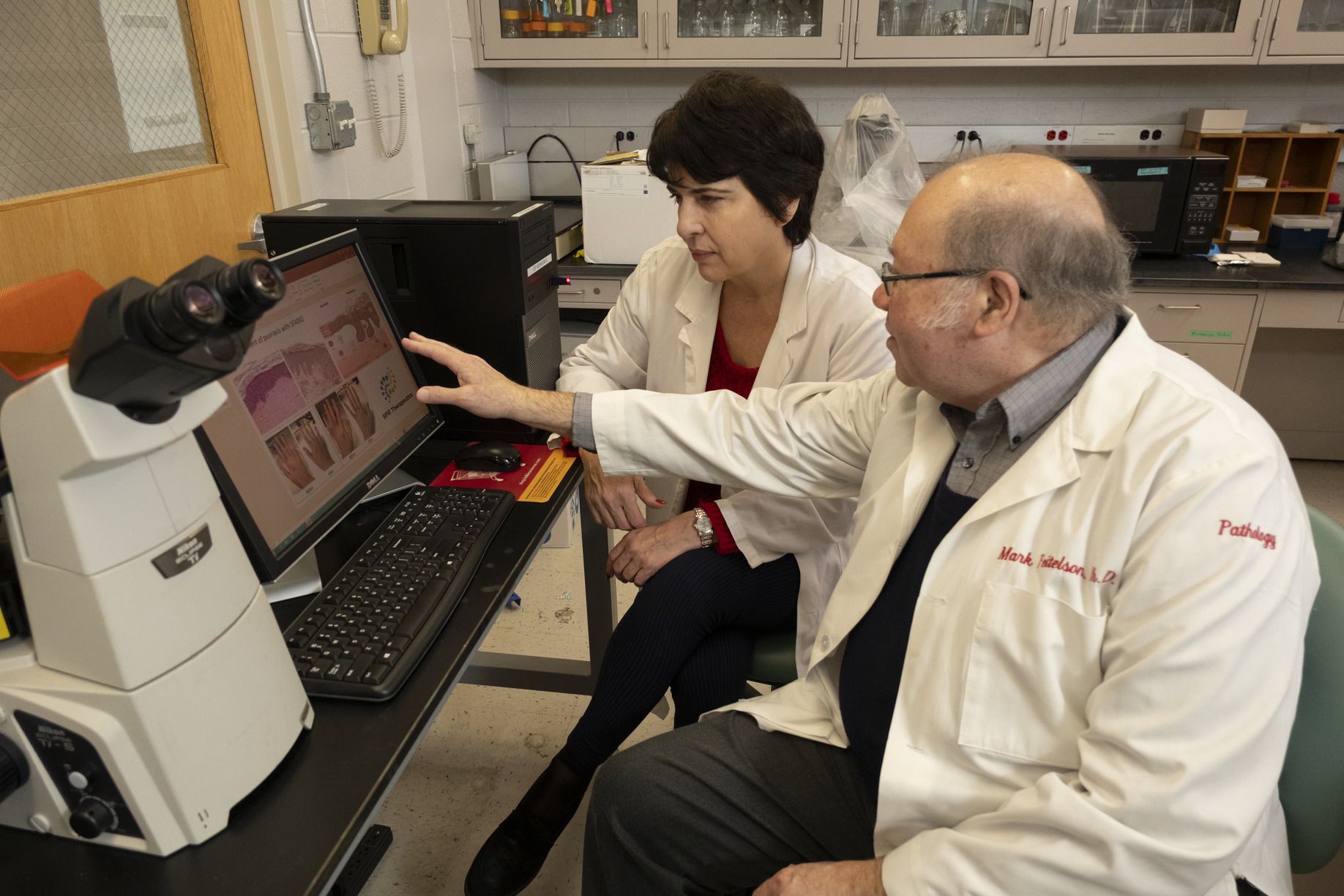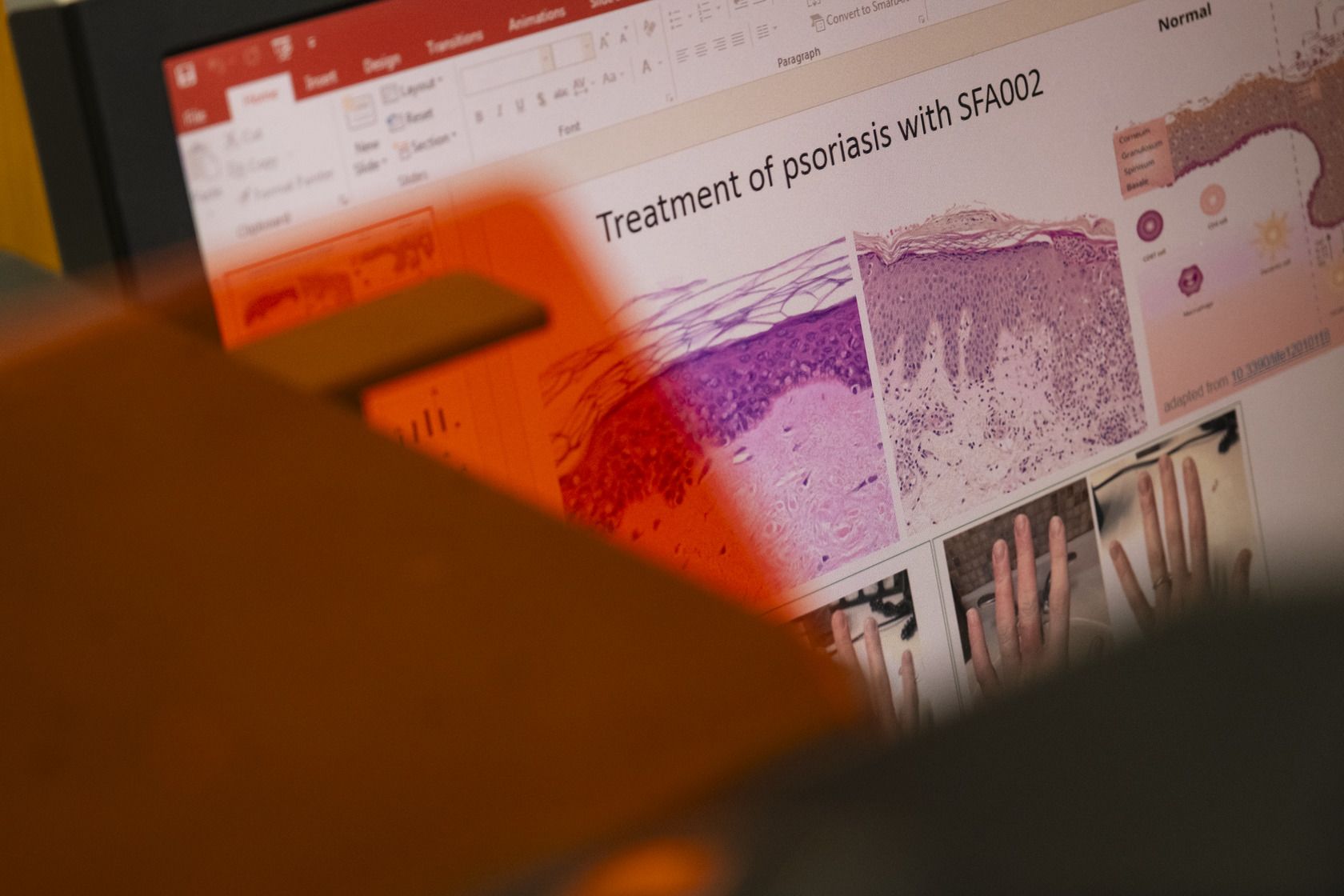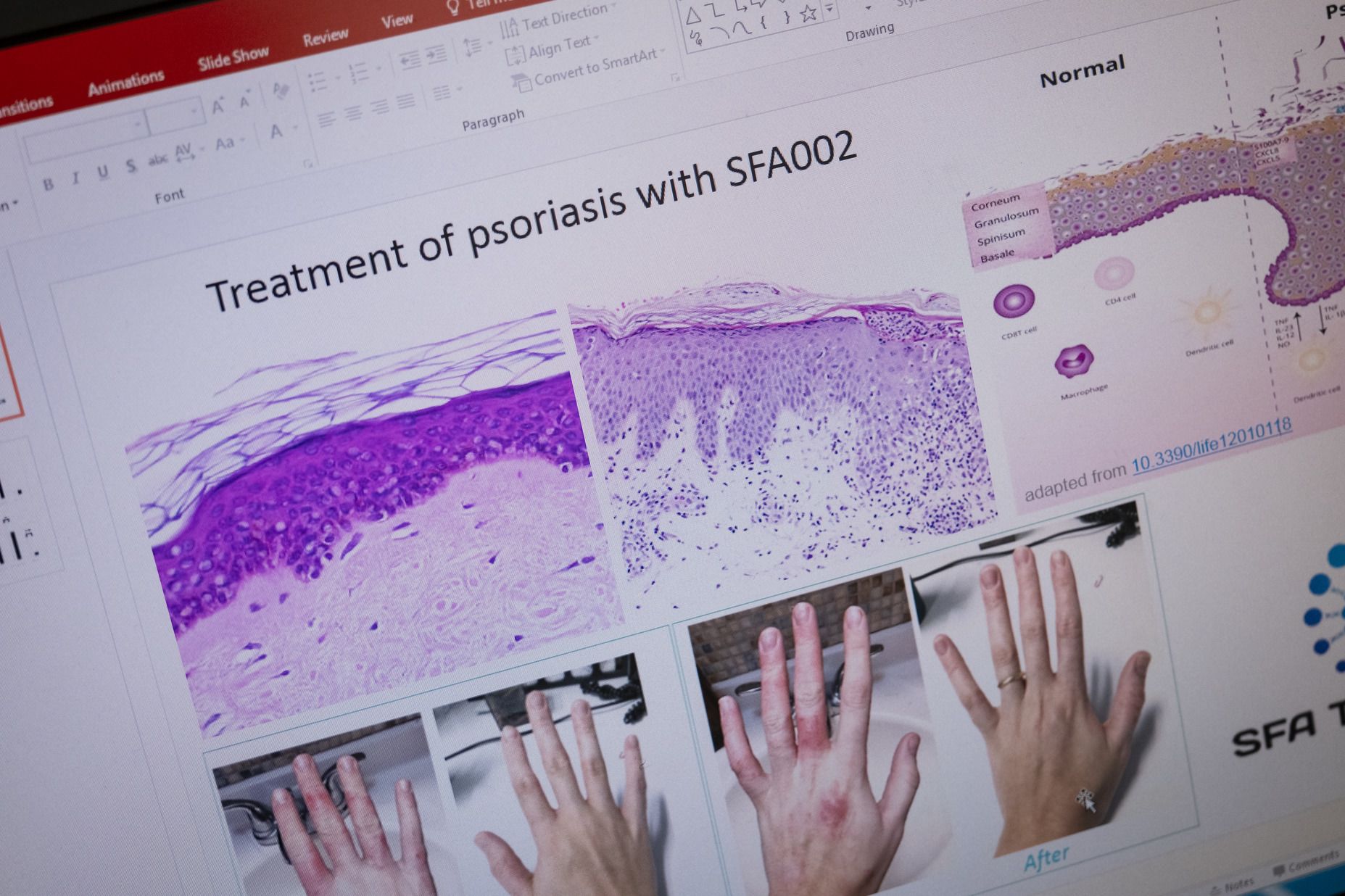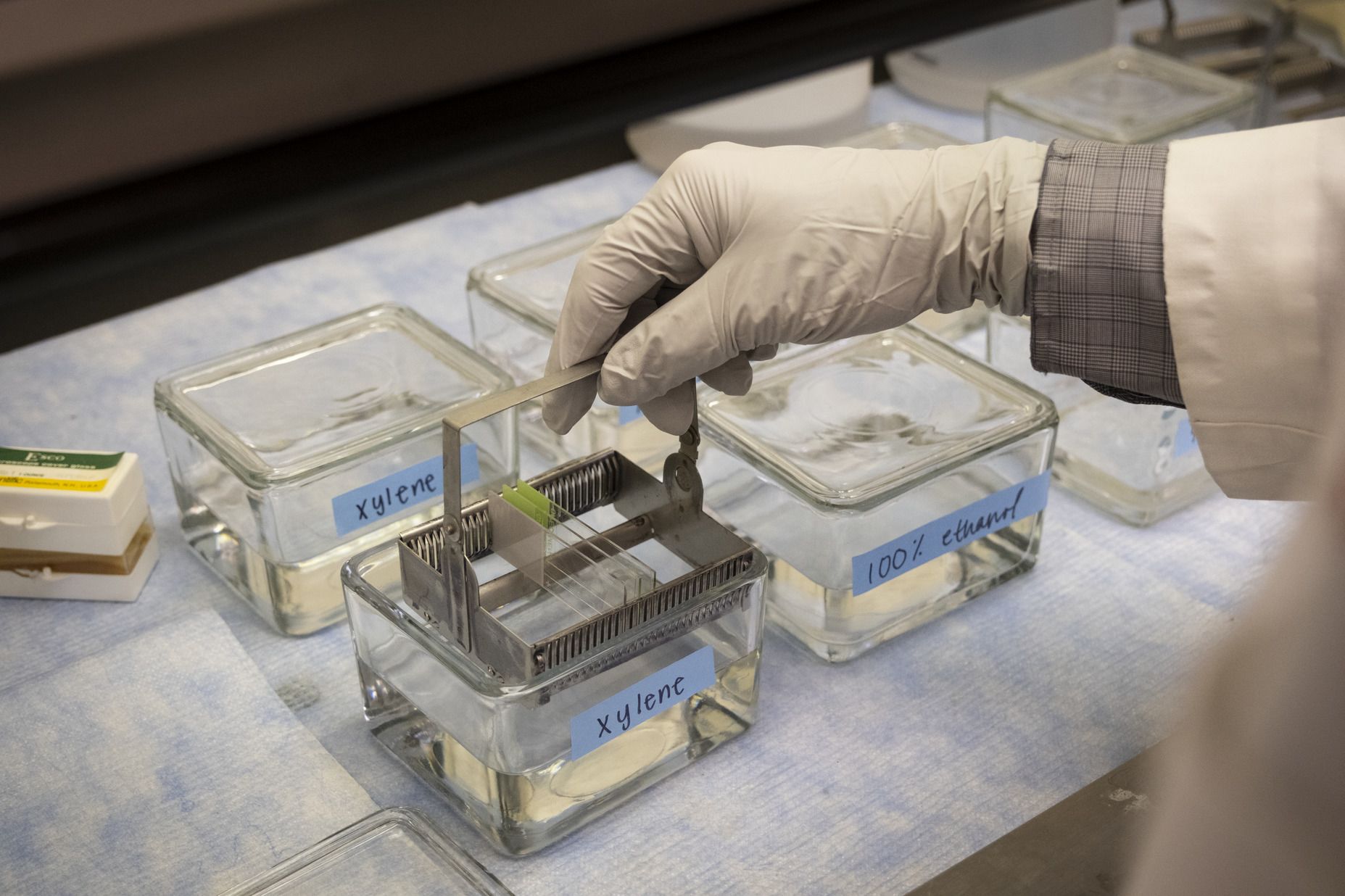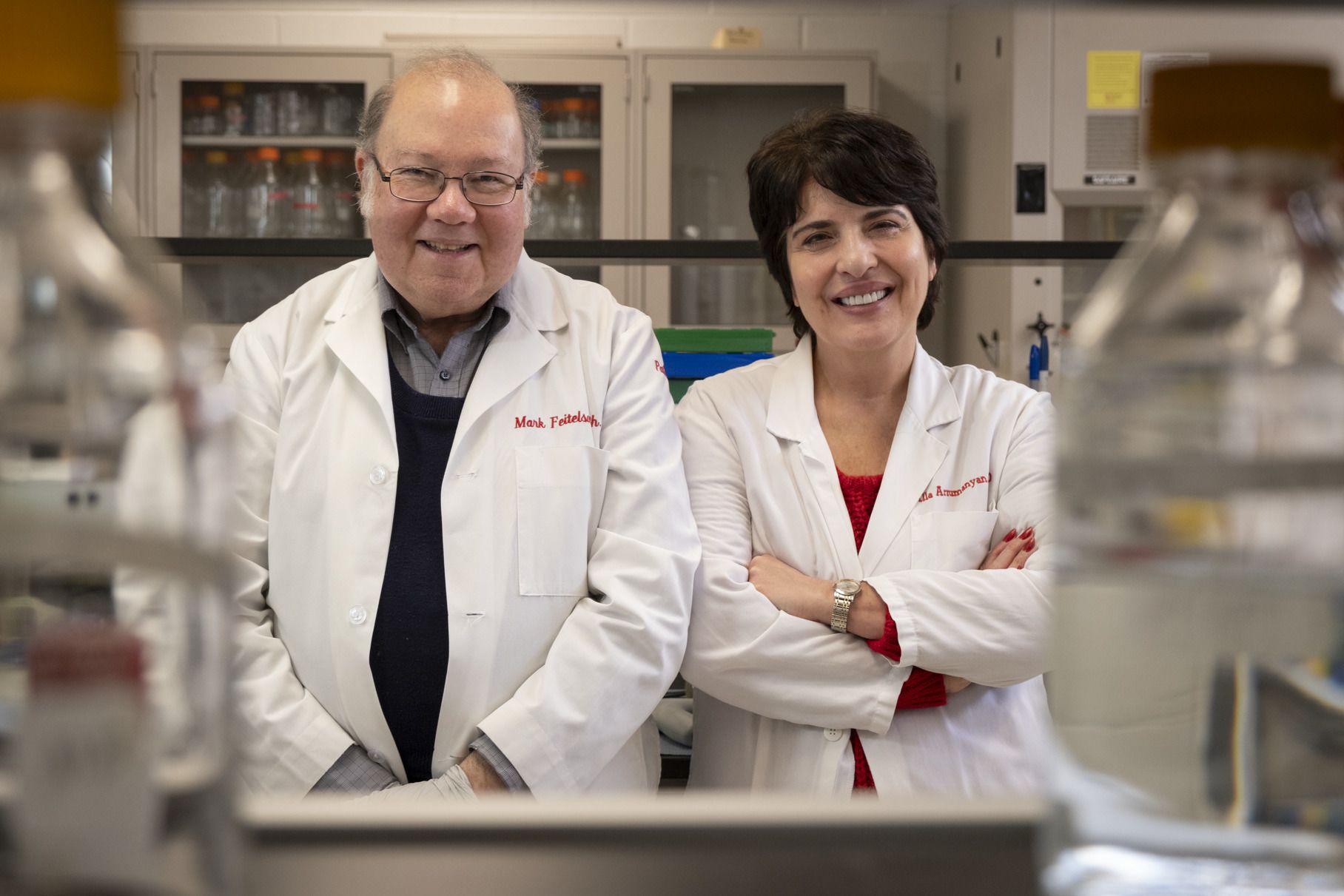Transforming the treatment of autoimmune disorders, cancer and more

Mark Feitelson and Alla Arzumanyan are developing drugs that use molecules harvested from the human body to safely and effectively treat a long list of diseases.
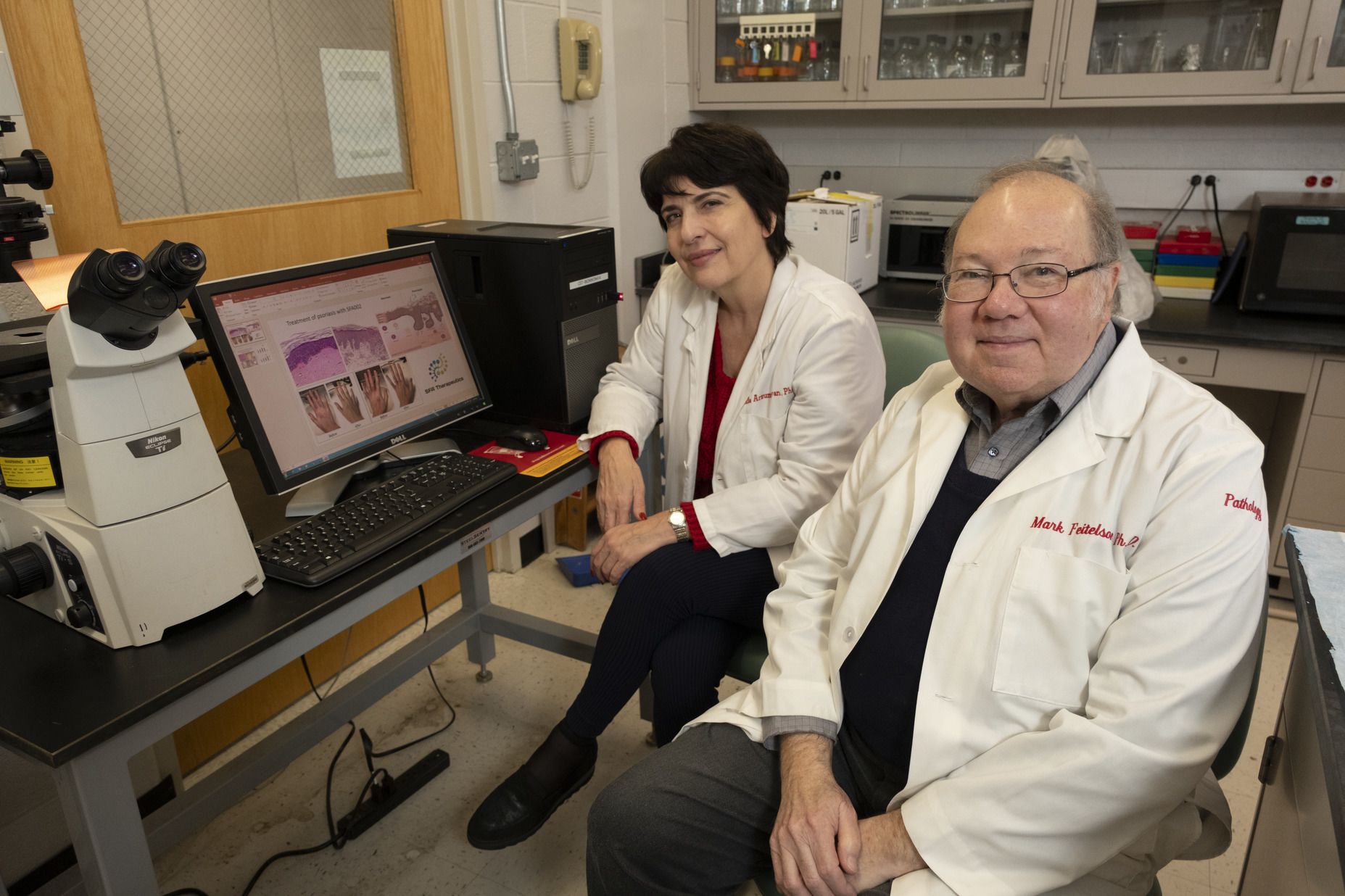
Tucked away in a biology lab on the fourth floor of Temple University’s Bio-Life Building, a pair of researchers are developing a revolutionary treatment that could be as profound as the discovery of insulin more than a century ago.
“If someone is diagnosed with diabetes, what do you do? You give them insulin,” said Alla Arzumanyan, associate professor of research in the Department of Biology. “The idea behind our company is these patients can’t make these metabolites, so what can we do? Give it to them in the form of a drug.”
Arzumanyan co-founded SFA Therapeutics Inc. in 2017 alongside Mark Feitelson, professor of biology, and Ira Spector, a drug developer with more than 30 years of experience.
Metabolites are small molecules produced during metabolism that play crucial roles in maintaining the body’s normal functions. The researchers are developing a set of metabolites that, when given to patients in drug form, can treat many diseases that do not presently have safe and effective drugs, including more than 40 autoimmune disorders, certain types of cancers and other illnesses like fatty liver.
“This is potentially a game-changer,” Spector said. “Because instead of treating symptoms, we may have something that changes the course of disease.”
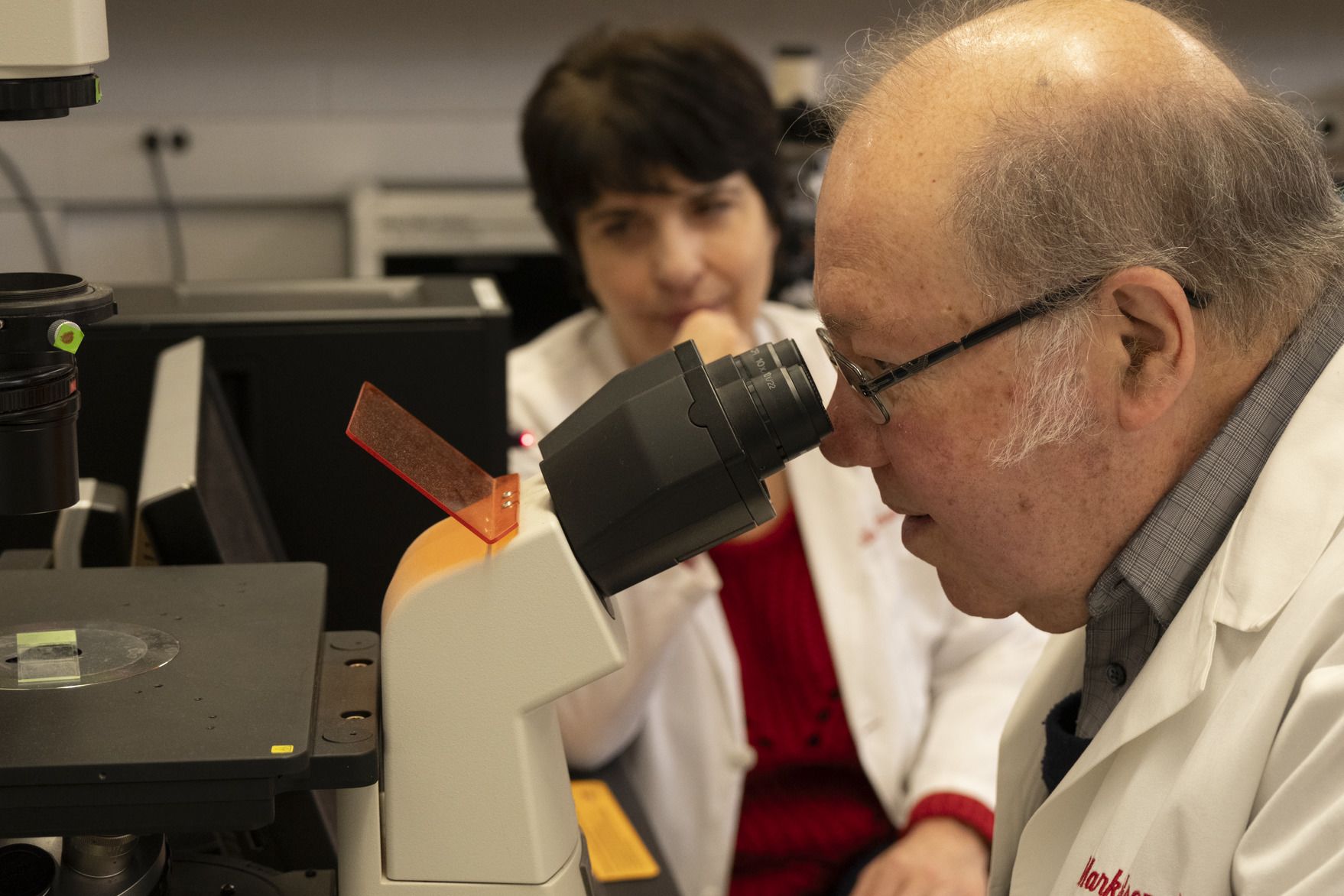
A theory sparked more than a decade ago
In 2013, Feitelson and Arzumanyan came across a scientific article that discussed using gut metabolites as a treatment in mice for colitis, a disease affecting the colon.
“I thought, well that’s really interesting that these gut metabolites work in the colon,” said Feitelson, who had been studying chronic liver disease for 30 years. “The question then became can you extend this concept of using gut metabolites to regulate the immune system in other parts of the body?”
He applied the concept to a study of liver disease he was conducting in his lab and found that the gut metabolites successfully treated inflammation in the liver, and they also slowed down the progression of liver disease to liver cancer.
Then Arzumanyan had a breakthrough: The same concept could be used to treat psoriasis, an autoimmune disease affecting the skin.
“Someone very close to me had severe psoriasis, so I had studied the pathogenesis of psoriasis to an extent,” she said. “There was an a-ha moment where it clicked in my mind. If you merge the mechanisms that cause psoriasis with the mechanisms affected by the gut metabolites, you realize there is great potential that the metabolites can treat this disease.”
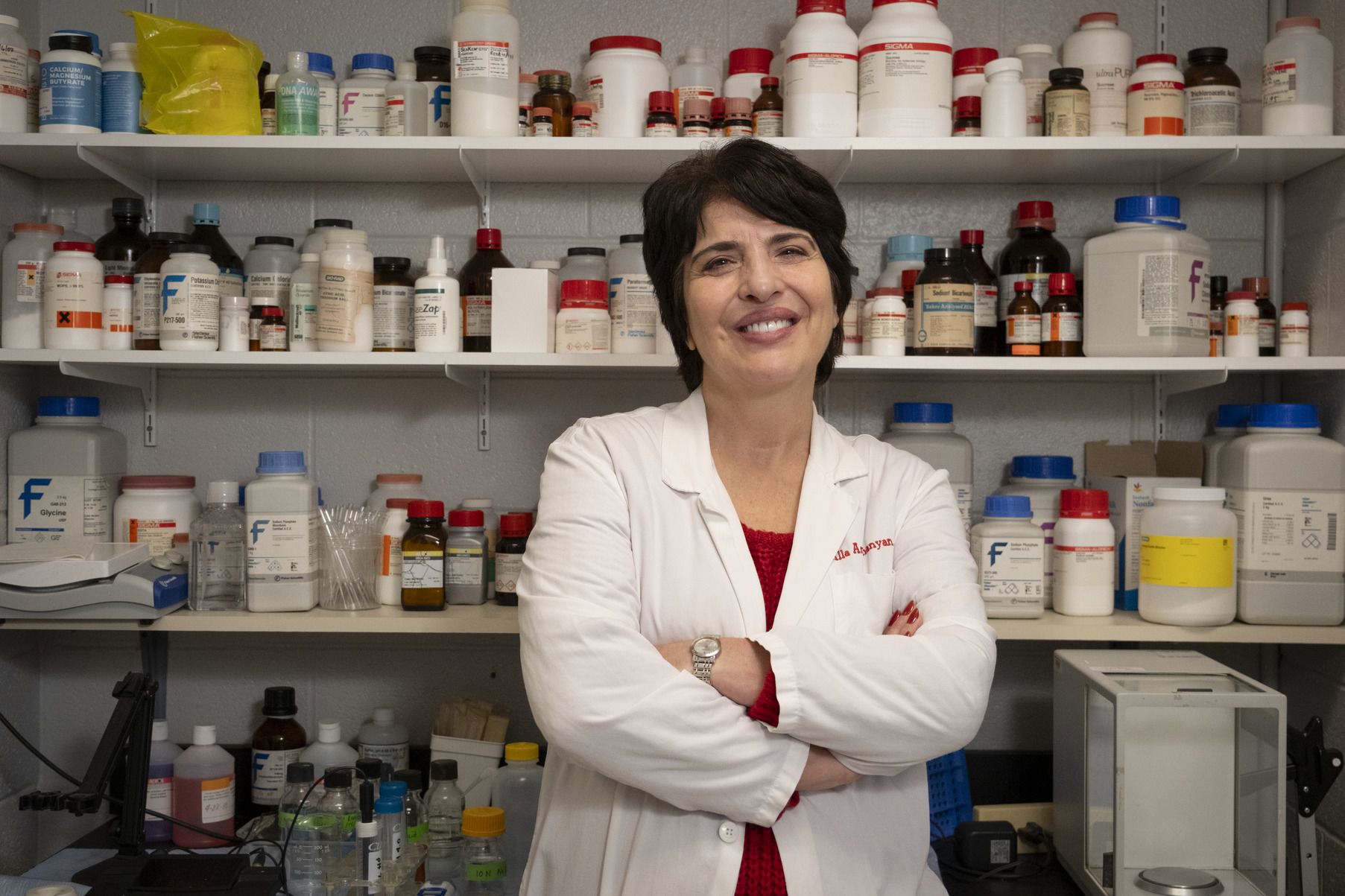
But the researchers were only scratching the surface of what was possible. Feitelson met Spector at a social event in 2015, where they discussed the research that Feitelson and Arzumanyan had been conducting. Thanks to Spector’s career in drug development, he recognized the potential for their approach to be applied to a wide range of autoimmune disorders and other illnesses.
“There are 300 million patients with autoimmune diseases. Now, imagine that there’s a potential link between them,” said Spector. “Twenty-five percent of patients have multiple autoimmune diseases. We think there is a set of metabolites that they can’t make in their body that we can make and provide for them as a drug.”
It’s a simple but elegant idea, and while the team has been testing it with success in humans with psoriasis, they have much larger ambitions for its application.
“What’s exciting is this is not a one-shot intervention against psoriasis or even a one-shot intervention against autoimmune diseases,” Spector continued. “This is a platform technology that enables us to target specific diseases and make drugs highly selective to the mechanisms associated with that disease.”
“If we can create a functional cure, then we have done something that no one’s been able to do in this field. And the drugs you see on TV that only treat symptoms will become obsolete, because we’ll have a drug that alters the course of disease.”
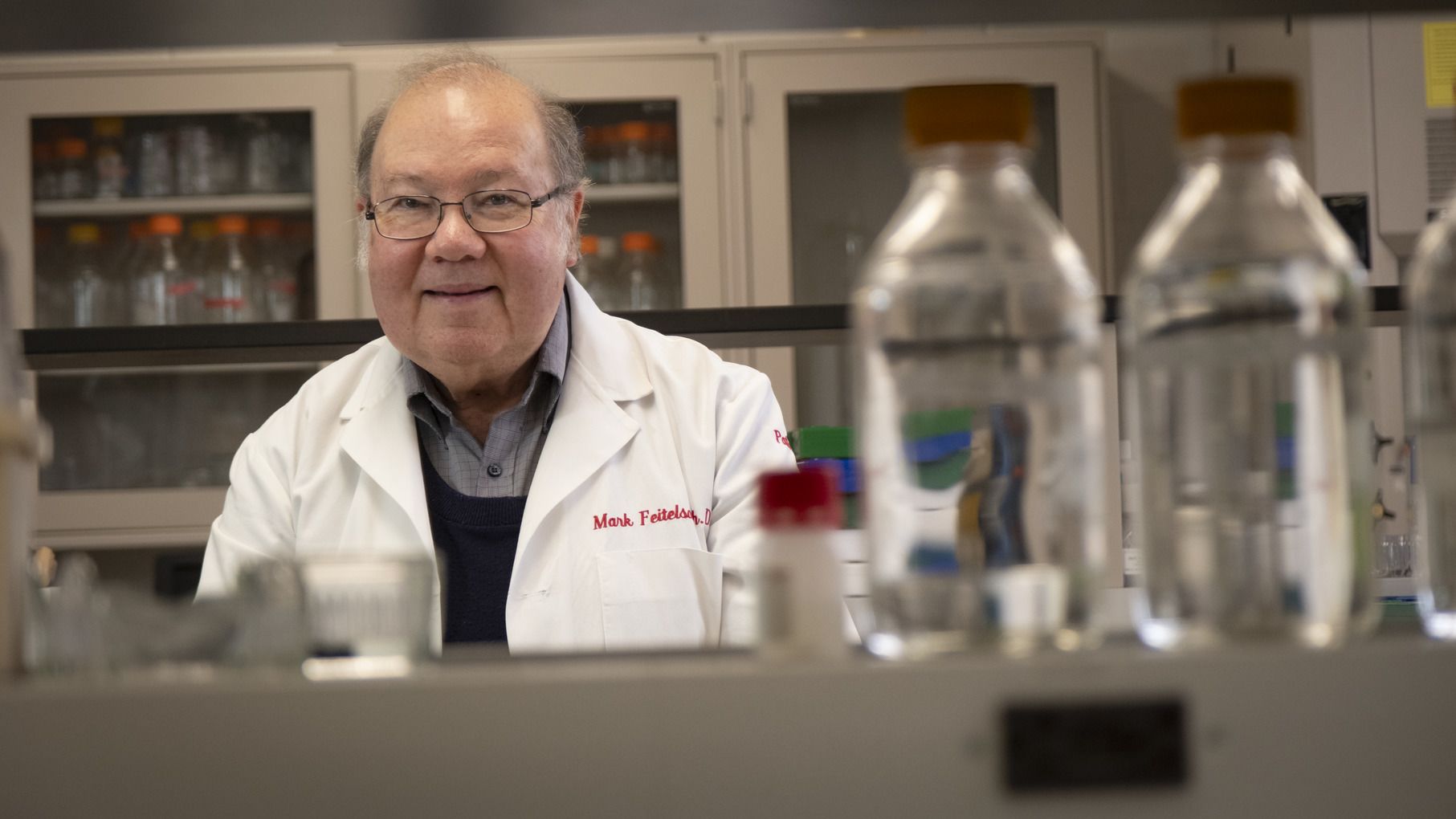
Drugs evolved by humans, for humans
The researchers are excited about much more than just the number of illnesses their treatment platform can target. Many current drugs for autoimmune disorders cause unwanted side effects because they use compounds not found in the human body. The SFA Therapeutics team is taking a different, more natural approach.
“We’re using molecules that have evolved with humans over a millennium of time. We don’t have to optimize them; evolution already has,” Feitelson said. “Because they come from our own bodies, at therapeutic doses we don’t have to worry about side effects, because these molecules belong in us as opposed to so many of the drugs on the market that were created from artificial sources. And normal cells are not affected by these treatments, so there is no toxicity.”
Arzumanyan explained that most drugs used to treat autoimmune diseases are immunosuppressive, meaning they suppress specific mechanisms significantly enough to cause side effects. But the drugs her team is developing are considered immunomodulatory, meaning they adjust those mechanisms back to their normal levels.
Current systemic drugs to treat psoriasis are immunosuppressive and are only recommended for about 20% of adult patients with severe cases. SFA Therapeutics’ treatment is safe enough to be used in the other 80% of adult patients and children with more moderate cases.
Another breakthrough came when the researchers found that patients taking their treatment for long enough periods could sometimes regain the ability to make these metabolites themselves.
“For the psoriasis drugs you see advertised on television, when you withdraw those drugs, the patients flare up and often have a worse disease than before,” Spector said. “We designed our clinical trial to include a one-month pause from treatment. Not only did our patients not flare up, but a number of them continued to improve. And when we put them back on the drug they improved even more.”
That result, the researchers said, could have revolutionary implications.
“Nothing out there does this,” Feitelson said. “It’s going to require more research, and it’s going to require longer trials. But if we can create a functional cure, then we have done something that no one’s been able to do in this field. And the drugs you see on TV that only treat symptoms will become obsolete, because we’ll have a drug that alters the course of disease. Moreover, this could be used to treat a long list of chronic inflammatory diseases, whose patients lack many of the same molecules that can be replaced by the drugs we are developing.”
Continuing to push forward
SFA Therapeutics has acquired a license from Temple University to commercialize the portfolio of technologies currently comprising 15 issued patents and 33 pending patent applications. They recently completed a Phase 1B clinical trial for psoriasis treatment, and Spector says they are getting ready to publish world-class results showing their psoriasis drug is both safe and efficacious (within the limitations of a Phase 1B clinical trial).
They’re now working on raising money to fund a Phase 2 trial, where they plan to confirm the results from their Phase 1 trials.
But while they move through the process of bringing their psoriasis treatment to market, the team will continue to explore possibilities for their treatment platform.
“We have come such a long way since Mark and I read that article more than 10 years ago,” Arzumanyan said. “This is not serendipity. It is invention on top of invention. We solved that first fundamental problem in 2013. Since then, we’ve solved problem after problem, and we are continuing to solve more.”
Also read
Become an Owl: Learn more about applying for one of our undergraduate, graduate or professional programs.
Leaders in research: The Office of the Vice President for Research fosters an innovation enterprise that runs throughout Temple University. As an R1 institution, our research opportunities involve everyone from undergraduate students to senior faculty.
Taking flight: The Innovation Nest at Temple University advances new discoveries, accelerates start-up growth, and connects the Temple community to the surrounding entrepreneurial and investment ecosystem.
Biology at Temple: The Department of Biology prepares graduates for impactful research and industry careers with its internationally recognized faculty.
News and more: Find out about what's going on at Temple University.


